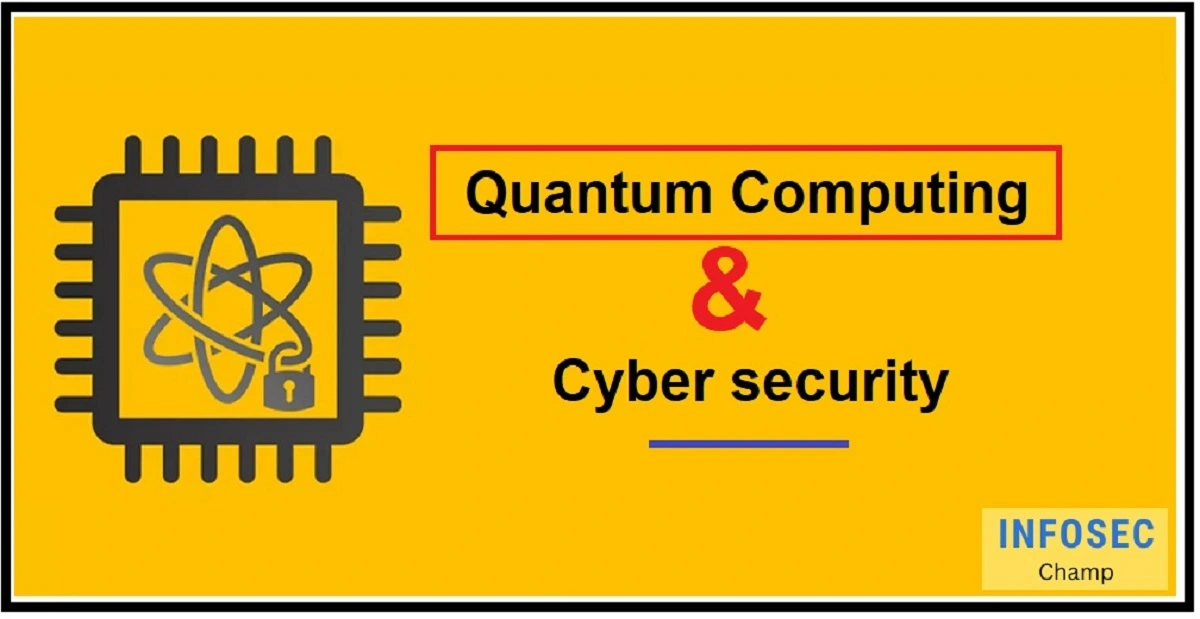Quantum computing security is the application of quantum computing to enhance the security of cryptographic techniques and communication systems. Many of the encryption techniques now used to protect communication and data storage can be broken using quantum computers. To protect communication against attacks by quantum computers, researchers are striving to create new quantum-resistant encryption techniques and quantum key distribution (QKD) protocols.
A type of computing known as quantum computing reshapes data using quantum-mechanical phenomena like superposition and entanglement. It offers the ability to resolve issues that conventional computers are currently unable to handle.
What is Quantum computing in security? | What is Quantum computing security?
Quantum computing has the ability to both improve and undermine existing security measures in the realm of security. On the one hand, using techniques like quantum encryption and quantum key distribution (QKD), quantum computers can be utilized to increase the security of communication systems and cryptographic algorithms. These techniques create and disseminate truly random encryption keys that are nearly impossible to decrypt because of the characteristics of quantum physics.
On the other hand, many of the encryption techniques now being used to protect communication and data storage could be broken by quantum computers. This is due to the fact that quantum computers are substantially quicker than conventional computers at solving specific mathematical issues, such as factoring huge integers.
This implies that in the future, encryption techniques that are today regarded as secure, like RSA and Elliptic Curve Cryptography, may become susceptible to quantum assaults.
As a result, scientists are striving to create new QKD protocols and quantum-resistant encryption techniques to safeguard communication against quantum computer attacks. They are also looking into novel data security techniques, such as quantum-safe data encryption, quantum-safe data access control, and quantum-safe cryptography.
Quantum Computing and Cybersecurity
Quantum computing and cybersecurity are closely related, as the development of quantum computers has the potential to both enhance and disrupt current cybersecurity systems.
On one hand, quantum computers can be used to improve the security of communication systems and cryptographic algorithms through methods such as quantum key distribution (QKD) and quantum encryption. These methods use the properties of quantum mechanics to generate and distribute truly random keys for encryption, making them virtually impossible to crack.
On the other hand, many of the encryption techniques now being used to protect communication and data storage could be broken by quantum computers. This is due to the fact that quantum computers are substantially quicker than conventional computers at solving specific mathematical issues, such as factoring huge integers. This implies that in the future, encryption techniques that are today regarded as secure, like RSA and Elliptic Curve Cryptography, may become susceptible to quantum assaults.
As a result, it is critical for researchers and cybersecurity specialists to stay up to date on the newest quantum computing advancements and to work on creating new quantum-resistant encryption techniques and QKD protocols to protect communication against assaults by quantum computers.
In addition, they are investigating novel techniques for data security, including quantum-safe data encryption, quantum-safe data access control, and quantum-safe cryptography.
It’s also worth noting that quantum computing can be used to improve cybersecurity in other ways, such as quantum machine learning which is a new branch of machine learning that uses quantum algorithms to improve the performance of machine learning models.
Overall, quantum computing has the potential to greatly enhance cybersecurity, but it also poses new threats that must be addressed, for quantum computing security also.

Is Quantum computing relevant to Cybersecurity?
With the development of technology, quantum computing is becoming more and more important to cybersecurity. Quantum key distribution (QKD) and quantum encryption are two techniques that could dramatically improve cybersecurity as large-scale, powerful quantum computers become available. These techniques create and disseminate truly random encryption keys that are nearly impossible to decrypt because of the characteristics of quantum physics.
Quantum computing, however, also brings about fresh cybersecurity risks. Future quantum assaults may be possible to break encryption techniques that are now thought to be secure, such as RSA and Elliptic Curve Cryptography, since quantum computers can solve some mathematical problems, like factoring big integers, considerably quicker than classical computers for quantum computing security.
This implies that a potent quantum computer would be able to crack many of the encryption techniques used to secure sensitive data, such as financial transactions and personal information.
In addition, quantum machine learning, which may be used to enhance the functionality of machine learning models used to find and exploit flaws in systems, can be used to enhance the skills of hackers and attackers.
The development of novel quantum-resistant encryption techniques, quantum-safe cryptography, quantum-safe data encryption, and quantum-safe data access control is therefore crucial for cybersecurity professionals and researchers in order to protect communications from attacks by quantum computers.
Overall, quantum computing offers cybersecurity both opportunities and challenges because it has the ability to significantly improve security but also introduces new dangers that must be dealt with.
Is Quantum computing a threat to security?
Security could be seriously jeopardized by quantum computing, especially in the domain of encryption. Future quantum assaults may be possible to break encryption techniques that are now thought to be secure, such as RSA and Elliptic Curve Cryptography, since quantum computers can solve some mathematical problems, like factoring big integers, considerably quicker than classical computers. This implies that a potent quantum computer would be able to crack many of the encryption techniques used to secure sensitive data, such as financial transactions and personal information for quantum computing security.
Additionally, quantum machine learning and other techniques can be utilized to enhance the ability of hackers and attackers.
This can be used to enhance the efficiency of machine learning models that are used to find and take advantage of security flaws in systems.
It’s important to keep in mind that quantum computing is still in its infancy, and it will take some time before large-scale, potent quantum computers are constructed. To secure communication against attacks by quantum computers, researchers are creating novel quantum-resistant encryption techniques and quantum key distribution (QKD) protocols.
In conclusion, quantum computing creates new security issues but also holds the promise of improving security through techniques like quantum encryption and quantum key distribution (QKD).
To protect communication from attacks by quantum computers, it’s crucial to stay up to date on the most recent quantum computing advancements and to work on creating new quantum-resistant encryption techniques, quantum-safe cryptography, quantum-safe data encryption, and quantum-safe data access control.
Will Quantum computing break security?
Many of the encryption techniques currently employed to protect communication and data storage may be disrupted by quantum computing. This is due to the fact that quantum computers are substantially quicker than conventional computers at solving specific mathematical issues, such as factoring huge integers. This implies that in the future, encryption techniques that are today regarded as secure, like RSA and Elliptic Curve Cryptography, may become susceptible to quantum assaults.
It’s important to keep in mind that strong, large-scale quantum computers that can defeat encryption techniques are not currently accessible and will take some time to develop. In order to protect communication from attacks by quantum computers, researchers are also constructing new quantum-resistant encryption techniques and quantum key distribution (QKD) protocols.
In other words, while quantum computing poses new difficulties for cybersecurity and encryption, it does not spell the end for existing security measures. To protect communication from attacks by quantum computers, it’s crucial to stay up to date on the most recent quantum computing advancements and to work on creating new quantum-resistant encryption techniques, quantum-safe cryptography, quantum-safe data encryption, and quantum-safe data access control.
How will quantum computing change security?
Security could be significantly altered by quantum computing, either for the better or for the worse. On the one hand, using techniques like quantum encryption and quantum key distribution (QKD), quantum computers can be utilized to increase the security of communication systems and cryptographic algorithms. These techniques create and disseminate truly random encryption keys that are nearly impossible to decrypt because of the characteristics of quantum physics.
On the other hand, many of the encryption techniques now being used to protect communication and data storage could be broken by quantum computers. This is due to the fact that quantum computers are substantially quicker than conventional computers at solving specific mathematical issues, such as factoring huge integers.
This implies that in the future, encryption techniques that are today regarded as secure, like RSA and Elliptic Curve Cryptography, may become susceptible to quantum assaults.
There are further ways in which quantum computing could alter the cybersecurity industry. As an illustration, a recent branch of machine learning called quantum machine learning makes use of quantum algorithms to enhance the performance of machine learning models, which may then be used to find and take advantage of weaknesses in systems.
In conclusion, quantum computing has the potential to significantly alter security by introducing new and more secure communication and encryption techniques, but it also poses new security risks that must be managed for quantum computing security.
The development of novel quantum-resistant encryption techniques, quantum-safe cryptography, quantum-safe data encryption, and quantum-safe data access control is vital as the technology develops in order to protect communication from attacks by quantum computers.
Can a Quantum computer be hacked?
The development of quantum computers is still in its infancy, and research into their security is ongoing. There are a number of ways a quantum computer could be hacked, albeit it is not yet known if this is possible.
The fact that qubits, the fundamental building blocks of quantum information, are extremely sensitive to their surroundings and are easily perturbed by outside elements like temperature and electromagnetic radiation, presents one possible weakness. As a result, they are open to alteration or interference by an adversary.
Another possible weakness is that, like conventional computers, a quantum computer’s software and command systems may be open to hacking efforts.
In this scenario, an attacker might try to use software flaws to gain unauthorized access to the quantum computer.
A quantum hack is when an attacker tries to intercept and modify the quantum signals that are utilized to carry out quantum calculations and control the qubits.
It’s important to remember that quantum computing is still in its infancy, and it is not yet certain how safe it will be in the future. New technologies and approaches are being actively developed by researchers to secure quantum computers and defend them from hacking attempts for quantum computing security.
Overall, it’s difficult to say whether or not a quantum computer can be hacked because the technology is still in its infancy and quantum computer security is a topic of active research. Nevertheless, it is clear that quantum computers will present new cybersecurity challenges, and it is important to be aware of potential vulnerabilities and to work on developing new quantum-safe methods and techniques to secure quantum computers against hacking attempts.

Quantum computing security risks
There are various security vulnerabilities associated with quantum computing, some of which include:
- Quantum Cryptanalysis: Quantum computers have the ability to circumvent many of the encryption protocols currently in use to protect data storage and communication. This is due to the fact that quantum computers are substantially quicker than conventional computers at solving specific mathematical issues, such as factoring huge integers. This implies that in the future, encryption techniques that are today regarded as secure, like RSA and Elliptic Curve Cryptography, may become susceptible to quantum assaults.
- Quantum hacking: Qubits are controlled and computations are carried out on quantum computers via quantum signals. Quantum hacking is the act of intercepting and manipulating quantum signals, which enables an attacker to prevent or take over the operation of a quantum computer.
- Quantum Impersonation: The ability to impersonate a legitimate quantum computer using a false quantum device that behaves like the real thing is known as quantum impersonation. This might give them access to confidential data or make the real quantum computer unable to function.
- Quantum Trojan: A hacker might perhaps insert a Trojan horse into the quantum computer, giving them access to confidential data or impairing the machine’s functionality.
- Quantum Side-Channel Attack: Quantum computers are susceptible to side-channel assaults, which enable a perpetrator to obtain sensitive data from a system by observing its physical characteristics, such as its electromagnetic emissions or power consumption.
- Quantum Denial-of-Service (DoS) and Distributed Denial-of-Service (DDoS) attack: Quantum computers are susceptible to distributed denial-of-service (DDoS) and denial-of-service (DoS) assaults, which could stop the quantum computer from operating or even cause it to crash.
It’s vital to remember that quantum computing is still in its early phases of development, and as the technology develops, additional security issues will probably be discovered. New technologies and approaches are being actively developed by researchers to secure quantum computers and guard them against these dangers for quantum computing security.
Quantum cybersecurity jobs
There is a growing need for professionals with knowledge of quantum cybersecurity as quantum computing technology develops. Following are some possible employment roles in this industry:
- Quantum security engineer: Quantum key distribution protocols and quantum-safe encryption techniques are designed and implemented by quantum security engineers to protect communication from assaults by quantum computers.
- Quantum security researcher: A quantum security researcher is a person who studies the security of quantum computing systems and creates new methods and tools to defend them from intrusion.
- Quantum security consultant: These experts provide organizations with guidance on how to protect their systems and data from threats based on quantum mechanics and help put quantum-safe security solutions into place.
- Quantum security analyst: These experts keep an eye out for any potential security flaws in quantum computing networks and systems, assess those flaws, and try to detect and reduce security threats.
- Quantum security architect: The overall security architecture of quantum computing systems and networks is designed and implemented by quantum security architects, who also work to keep them safe from attackers.
- Quantum cryptography engineer: Engineers in quantum cryptography create and develop quantum-safe cryptographic systems and protocols, as well as evaluate and test their security.
- Quantum machine learning security engineer: Engineers that specialize in the security of quantum machine learning create, construct, and test machine learning models that are immune to quantum attacks.
It’s important to note that many of these professions are interdisciplinary and call for expertise in both cybersecurity and quantum computing, so having a background in both areas is advantageous. For people interested in quantum cyber security, there are other chances in academia, government, and private enterprise for quantum computing security.
Top 15 Quantum cybersecurity companies | Quantum computing security companies
- IonQ: A business that creates software and hardware for quantum computers
- ID Quantique: A business that offers communication networks and data centers quantum-safe security solutions.
- Quintessence Labs: A provider of solutions for key management and quantum-safe encryption.
- Cambridge Quantum Computing: A company that offers software and services for quantum computing is Cambridge Quantum Computing.
- Zapata Computing: Software for quantum computing and quantum machine learning is created by Zapata Computing.
- PQShield: A business that offers embedded and IoT devices quantum-safe cryptography solutions
- QuTech: A business that creates quantum computing tools and technology
- Quantum Motion: Creating quantum-safe encryption methods for cloud services is Quantum Motion.
- Qubitekk: A business that offers communication networks quantum-safe encryption solutions
- Quantum Xchange: A business that offers quantum-safe key distribution solutions for communication networks is called Quantum Xchange.
- Quantum Motion Technologies: A business that creates quantum computing tools is called Quantum Motion Technologies.
- Post-Quantum: A business that offers financial services to customers with quantum-safe encryption solutions is called Post-Quantum.
- MagiQ Technologies: For communication networks, MagiQ Technologies offers quantum-safe encryption systems.
- KETS Quantum Security: A firm that offers quantum-safe encryption for communication networks is KETS Quantum Security.
- ISARA Corporation: A business that offers quantum-safe encryption solutions for IoT gadgets and communication networks.
Other businesses operate in this industry, therefore this list is not all-inclusive. It’s important to note that the field of quantum cybersecurity and computing is fast developing, and new businesses are constantly springing up.
Quantum cyber attacks
Although quantum computing has the potential to significantly improve cybersecurity, it also introduces new risks to established cybersecurity measures. A few instances of quantum cyberattacks are as follows:
- Quantum Cryptanalysis: As I already indicated, many of the encryption techniques now being used to safeguard communication and data storage can be broken by quantum computers. This is due to the fact that quantum computers are substantially quicker than conventional computers at solving specific mathematical issues, such as factoring huge integers.
- Quantum hacking: Qubits are controlled and computations are carried out on quantum computers via quantum signals. Quantum hacking is the act of intercepting and manipulating quantum signals, which enables an attacker to prevent or take over the operation of a quantum computer.
- Quantum Impersonation: The ability to impersonate a legitimate quantum computer using a false quantum device that behaves like the real thing is known as quantum impersonation. This might give them access to confidential data or make the real quantum computer unable to function.
- Quantum Trojan: A hacker might perhaps insert a Trojan horse into the quantum computer, giving them access to confidential data or impairing the machine’s functionality.
- Quantum Side-Channel Attack: Quantum computers are susceptible to side-channel assaults, which enable a perpetrator to obtain sensitive data from a system by observing its physical characteristics, such as its electromagnetic emissions or power consumption.
- Quantum Denial-of-Service (DoS) and Distributed Denial-of-Service (DDoS) attack: Quantum computers are susceptible to distributed denial-of-service (DDoS) and denial-of-service (DoS) assaults, which could stop the quantum computer from operating or even cause it to crash.
It’s important to remember that quantum computing is still in its early phases of development, and as the technology develops, new kinds of quantum cyberattacks will probably be discovered. In order to defend against quantum cyberattacks, it’s critical to stay up to date on the most recent quantum computing breakthroughs and to work on creating new quantum-safe procedures and approaches.
Quantum computing applications in Cybersecurity
Quantum computing has the potential to significantly improve cybersecurity in a number of areas, such as:
- Quantum Key Distribution (QKD): Quantum computing can be used to increase the security of communication systems through a technique called quantum key distribution (QKD), which creates and distributes truly random encryption keys that are nearly hard to decrypt.
- Quantum Encryption: By developing encryption techniques that are immune to quantum attacks, quantum computing can be utilized to increase the security of encryption algorithms.
- Quantum-safe Cryptography: Quantum-safe Lattice-based, multivariate, and code-based cryptography are only a few examples of novel cryptographic techniques that can be created using quantum computing that is immune to quantum attacks.
- Quantum-safe Data Encryption: New encryption techniques for data storage that are immune to quantum attacks can be developed using quantum computing.
- Quantum-safe Data Access Control: Quantum computing can be utilized to create novel approaches to restricting access to data that are resilient to quantum attacks.
- Quantum Machine Learning: Machine learning models can be used to find and take advantage of weaknesses in systems by using quantum computing to enhance their performance.
Quantum Random Number Generation: By using quantum computing to create really random numbers, encryption and authentication systems can be made more secure for quantum computing security.

Top 20 Benefits and Risks of Quantum computing | Quantum Computing benefits
- Greater computing power: Compared to conventional computers, quantum computers are substantially faster at some sorts of calculations.
- Drug discovery: Drug development can be accelerated by the use of quantum computing to simulate the behavior of molecules and chemical reactions.
- Machine learning: The performance of machine learning algorithms can be enhanced, and new kinds of machine learning algorithms can be created, using quantum computing.
- Financial modeling: Using quantum computing, one may run intricate financial simulations and improve the performance of a portfolio.
- Weather forecasting: Quantum computing can be used to process massive volumes of weather data and produce predictions that are more accurate.
- Cryptography: Quantum computing can be utilized to create new, quantum-resistant techniques for encryption and key distribution.
- Supply chain optimization: By using quantum computing, logistics and transportation networks can be made more effective and efficient, lowering costs.
- Climate modelling: Quantum computing can be used to process enormous volumes of climate data and produce more precise predictions for climate change.
- Traffic optimization: Quantum computing can be utilized to improve traffic flow and lessen congestion in urban areas.
- Artificial intelligence: Quantum computing can be utilized to enhance the functionality of artificial intelligence algorithms and to create new kinds of AI.
- Optimization problems: Complex optimization issues, like the traveling salesman problem, can be resolved using quantum computing.
- Quantum simulation: Quantum computing can be used to create novel materials and technologies as well as simulate the behavior of quantum systems.
- Quantum cryptography: New techniques for secure communication, including quantum key distribution, can be developed using quantum computers.
- Quantum error correction: New techniques for fixing faults in quantum calculations can be developed using quantum computing.
- Quantum machine learning: By using quantum computing, machine learning algorithms can perform better and new kinds of machine learning can be created.
- Quantum imaging: The resolution and sensitivity of imaging systems can be increased using quantum computing.
- Quantum sensing: The accuracy and precision of sensing technology can be increased using quantum computing.
- Quantum metrology: The accuracy and precision of measuring technology can be increased using quantum computing.
- Quantum computing as a service: The ability to obtain quantum computing power without having to construct and maintain one’s own quantum computer is possible with quantum computing as a service for quantum computing security.
- Quantum Internet: A new kind of internet that is quicker and more secure than the current internet can be created using quantum computing.
Quantum computing security issues | Quantum computing security vulnerabilities
Quantum computing raises a number of security concerns, some of which are as follows:
- Quantum Cryptanalysis: Quantum computers have the ability to circumvent many of the encryption protocols currently in use to protect data storage and communication. This is due to the fact that quantum computers are substantially quicker than conventional computers at solving specific mathematical issues, such as factoring huge integers. This implies that in the future, encryption techniques that are today regarded as secure, like RSA and Elliptic Curve Cryptography, may become susceptible to quantum assaults.
- Quantum hacking: Qubits are controlled and computations are carried out on quantum computers via quantum signals. Quantum hacking is the act of intercepting and manipulating quantum signals, which enables an attacker to prevent or take over the operation of a quantum computer.
- Quantum Impersonation: The ability to impersonate a legitimate quantum computer using a false quantum device that behaves like the real thing is known as quantum impersonation. This might give them access to confidential data or make the real quantum computer unable to function.
- Quantum Trojan: A hacker might perhaps insert a Trojan horse into the quantum computer, giving them access to confidential data or impairing the machine’s functionality.
- Quantum Side-Channel Attack: Quantum computers are susceptible to side-channel assaults, which enable a perpetrator to obtain sensitive data from a system by observing its physical characteristics, such as its electromagnetic emissions or power consumption.
Quantum computing security NIST
By improving measurement science, standards, and technology, the National Institute of Standards and Technology (NIST), a federal organization in the United States, is in charge of fostering innovation and economic competitiveness. With an emphasis on creating new quantum-resistant cryptographic standards, evaluating quantum-safe cryptographic algorithms, and offering advice on how to put quantum-safe cryptography into practice, NIST has been actively engaged in research on quantum computing security.
NIST has engaged in a number of specialized activities in the domain of quantum computing security, such as:
- The NIST Post-Quantum Cryptography (PQC) standardization project: The NIST Post-Quantum Cryptography (PQC) standardization project’s goal is to find and standardize new quantum-resistant cryptographic algorithms that can take the place of current encryption techniques that might be subject to quantum assaults.
- The NIST Randomness Beacon: The NIST Randomness Beacon is a free service that produces really random integers that can be used to seed cryptographic keys and other applications that require high levels of security.
- The NIST Quantum Key Distribution (QKD) project: The NIST Quantum Key Distribution (QKD) project intends to provide new QKD standards and protocols to protect communication from assaults by quantum computers.
- The NIST Quantum Computing Framework (NCF): This framework offers recommendations and industry best practices for putting quantum-safe encryption into use and fending off quantum cyberattacks.
- Quantum Information Program (QuIP) of NIST: Research on quantum information science and technology is done by this program, including quantum computing and quantum communication.
Quantum computing security stocks
Numerous businesses are working to develop and market quantum computing technologies as well as related security solutions. Some of these businesses trade publicly, allowing investors to buy and sell their stock on stock exchanges. Here are a few instances of businesses engaged in quantum security and computing stocks:
- D-Wave Systems (DWVE): D-Wave Systems (DWVE) is a Canadian firm that develops and produces both quantum hardware and quantum software. It can be bought and sold openly on the Toronto Stock Exchange.
- IonQ (IONQ): IonQ (IONQ) is a business that develops and produces quantum computing hardware and software. It is offered for public trading on the NASDAQ stock market.
- Honeywell International Inc. (HON): Honeywell is a corporation that offers a variety of technological solutions, such as security solutions and systems for quantum computing. It is a publicly traded stock on the NYSE.
- Rigetti Computing (RIGETTI): In addition to developing and producing quantum computing hardware and software, Rigetti Computing (RIGETTI) also offers cloud-based quantum computing services. It is a publicly traded stock on the NYSE.
- Google (GOOGL): Google is a technology firm working on quantum computing technology and related security solutions. It is offered for public trading on the NASDAQ stock market.
It’s important to note that the subject of quantum computing and security is fast developing, and new businesses are constantly springing up. Furthermore, the stock market can be unexpected, and a company’s stock performance is not always a reliable indicator of its financial situation or potential for future success. Before buying any stock, it is always advisable to do your own research and speak with a financial expert.
Quantum computing problem | Quantum computing security problem | Quantum computing security attack
The field of technology known as quantum computing is young and developing quickly. It has the potential to transform computing in many ways, but it also presents some new difficulties. The following are some of the significant issues or difficulties with quantum computing:
- Scalability: It is difficult to build large-scale quantum computers because doing so needs the capacity to precisely control and manipulate a lot of qubits, which are the fundamental building blocks of quantum information.
- Error correction: Due to the sensitivity of quantum computing to errors, which can be caused by a variety of variables including noise in the qubits or interactions between qubits. A significant problem for quantum computing is the creation of efficient error correction techniques.
- Quantum software: Software for quantum computers is currently being developed, and it is a challenging process that calls for a thorough grasp of the special characteristics of quantum systems.
- Quantum algorithms: A significant problem in the subject is the development of novel quantum algorithms that can benefit from the special characteristics of quantum computers.
- Quantum security: Security issues posed by quantum computing include the potential to circumvent encryption techniques that are now thought to be secure. One of the main areas of research is the creation of novel quantum-safe cryptography systems and approaches to defend against quantum cyber assaults.
- Quantum-classical interface: One of the biggest challenges in the industry is coming up with efficient techniques to connect classical computers and quantum computers.
The field of quantum computing is continually developing, and numerous issues are still being investigated and created solutions for.
Additionally, in order for quantum computing to function, specific hardware and cooling systems are needed, which can be expensive and challenging to maintain.
Additionally, quantum computing calls for specific knowledge and abilities that can be hard to come by and keep in the workforce.
Quantum computing also raises ethical questions, such as how to maintain confidentiality and privacy in a quantum computing setting and how to avoid using quantum computing for bad intentions for quantum computing security.

